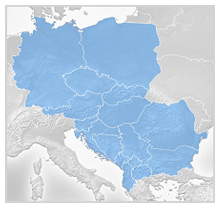17th ZEVA Symposium
Skopje, Macedonia, 2. October 2010
hosted by the Medical Chamber of Macedonia
The annual ZEVA Symposium provides a platform for exchange between physicians’ chambers from Central and Eastern European countries. During the symposium, representatives from EU and non-EU member states discuss common challenges and share experiences in order to find ways to improve the working environment of physicians and the quality of healthcare in the interest of all patients. The central focus of the 17th ZEVA Symposium, which was held in Skopje, Macedonia, was patient safety and quality in healthcare. After a fruitful discussion, the participating countries agreed on the:
Skopje Declaration on Patient Safety and Quality in Healthcare
Safety is the core element of quality in healthcare.
Physicians have an ethical and professional obligation to always strive for continuous
quality improvement in healthcare and must ensure patient safety during all medical
decision making.
Physician self-regulation is based on the trust invested in the medical profession.
Physicians’ chambers assume this responsibility and guarantee high standards of medical
practice and the ethical provision of medical services by physicians. Patient safety and
quality in healthcare are core elements that drive the chambers’ decisions on policy,
ethics, education and training.
By being competent advocates for patient safety, physicians prove their credibility in the
political arena and to the public. Governments should recognize the crucial role of
physicians and physicians’ chambers in all matters relating to patient safety.
Patient safety incidents are often reported as errors by individual physicians. However,
research has shown that nearly all incidents are actually a result of system failure and
rarely errors by individuals.
Physicians should take a leading role in patient safety and be included in analyzing complex health information processes that lead to errors or create the potential for errors.
A Critical Incident Reporting System could be a valuable and effective physician-driven
instrument. A blame free reporting culture is a precondition for this.
Most countries face similar challenges in improving patient safety. These primarily
concern the provision of appropriate education and training, ensuring a safe working
environment, building and maintaining a suitable infrastructure, as well as guaranteeing
sufficient financial and human resources.
Patient safety and quality of care should take particularly high priority when considering
task shifting in the delivery of health services. The role of physicians as the health professionals with overall responsibility for diagnosis and treatment is crucial in this
respect.
Physicians’ chambers should promote policies on patient safety to all physicians in their
country and support the development of appropriate post-graduate medical education.
Physicians’ chambers in the ZEVA region should continue to share experiences in the
field of patient safety and foster more intense collaboration.
The physicians’ chambers in the ZEVA region fully endorse the World Medical
Association’s “Declaration on Guidelines for Continuous Quality Improvement in
Healthcare” and the WMA “Declaration on Patient Safety”.
